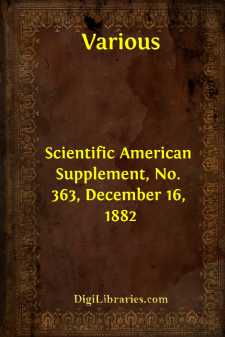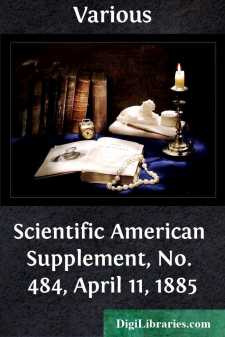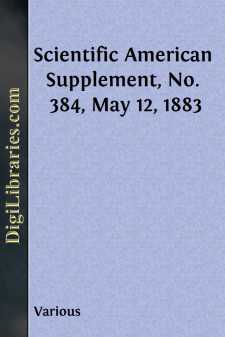Categories
- Antiques & Collectibles 13
- Architecture 36
- Art 48
- Bibles 22
- Biography & Autobiography 813
- Body, Mind & Spirit 142
- Business & Economics 28
- Children's Books 14
- Children's Fiction 11
- Computers 4
- Cooking 94
- Crafts & Hobbies 4
- Drama 346
- Education 46
- Family & Relationships 57
- Fiction 11828
- Games 19
- Gardening 17
- Health & Fitness 34
- History 1377
- House & Home 1
- Humor 147
- Juvenile Fiction 1873
- Juvenile Nonfiction 202
- Language Arts & Disciplines 88
- Law 16
- Literary Collections 686
- Literary Criticism 179
- Mathematics 13
- Medical 41
- Music 40
- Nature 179
- Non-Classifiable 1768
- Performing Arts 7
- Periodicals 1453
- Philosophy 64
- Photography 2
- Poetry 896
- Political Science 203
- Psychology 42
- Reference 154
- Religion 513
- Science 126
- Self-Help 84
- Social Science 81
- Sports & Recreation 34
- Study Aids 3
- Technology & Engineering 59
- Transportation 23
- Travel 463
- True Crime 29
Punch, or the London Charivari, Volume 1, August 14, 1841
by: Various
Categories:
Description:
Excerpt
THE WIFE CATCHERS.
A LEGEND OF MY UNCLE’S BOOTS.
In Four Chapters.
Haberdashers, continued my friend the boot, are wonderful people; they make the greatest show out of the smallest stock—whether of brains or ribbons—of any men in the world. A stranger could not pass through the village of Ballybreesthawn without being attracted by a shop which occupied the corner of the Market-square and the main street, with a window looking both ways for custom. In these windows were displayed sundry articles of use and ornament—toys, stationery, perfumery, ribbons, laces, hardware, spectacles, and Dutch dolls.
In a glass-case on the counter were exhibited patent medicines, Birmingham jewellery, court-plaister, and side-combs. Behind the counter might be seen Mr. Matthew Tibbins, quite a precedent for country shop-keepers, with uncommonly fair hair and slender fingers, a profusion of visible linen, and a most engaging lisp. In addition to his personal attractions, Tibbins possessed a large stock of accomplishments, which, like his goods, “might safely challenge competition.” He was an acknowledged wit, and retailed compliments and cotton balls to the young ladies who visited his emporium. As a poet, too, his merits were universally known; for he had once contributed a poetic charade to the Ladies’ Almanack. He, moreover, played delightfully on the Jews’-harp, knew several mysterious tricks in cards, and was an adept in the science of bread and butter-cutting, which made him a prodigious favourite with maiden aunts and side-table cousins. This was the individual whom fate had ordained to cross and thwart Terence in his designs upon the heart of Miss Biddy O’Brannigan, and upon whom that young lady, in sport or caprice, bestowed a large dividend of those smiles which Terence imagined should be devoted solely to himself.
The man of small wares was, in truth, a dangerous rival, from his very insignificance. Had he been a man of spirit or corporal consideration, Terence would have pistolled or thrashed him out of his audacious notions; but the creature was so smiling and submissive that he could not, for the life of him, dirty his fingers with such a contemptible wretch. Thus Tibbins continued flattering and wriggling himself into Miss Biddy’s good graces, while Terence was fighting and kissing the way to her heart, till the poor girl was fairly bothered between them.
Miss Biddy O’Brannigan, I should have told you, sir, was an heiress, valued at one thousand pounds in hard cash, living with an old aunt at Rookawn Lodge, about six miles from Ballybreesthawn; and to this retreat of the loves and graces might the rival lovers be seen directing their course, after mass, every Sunday;—the haberdasher in a green gig with red wheels, and your uncle mounted on a bit of blood, taking the coal off Tibbins’s pipe with the impudence of his air, and the elegant polish of your humble servants.
Matters went on in this way for some time—Miss O’Brannigan not having declared in favour of either of her suitors—when one bitter cold evening, I remember it was in the middle of January, we were whipped off our peg in the hall, and in company with our fellow-labourers, the buckskin continuations, were carried up to your uncle, whom we found busily preparing for a ball, which was to be given that night by the heiress of Rookawn Lodge....












